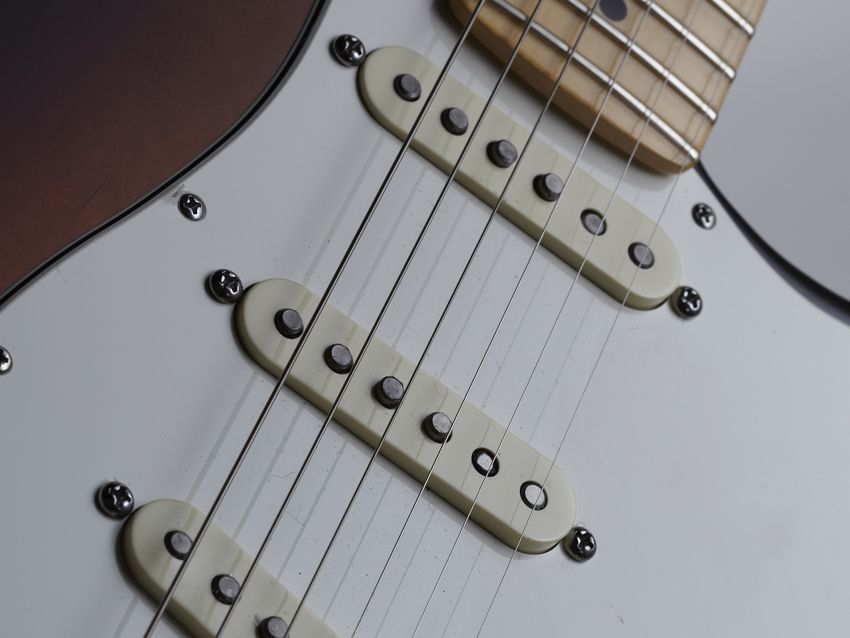Which Guitar Is Right For You?
Have you ever been to a music store wanting to buy a guitar, but not sure of which one to pick? Ever felt that the guitars you own sound or look out of place? I'm writing this blog to guide you guitar players in choosing the right guitar for you.
The Pickup War
Top: Single-Coil Pickups; Bottom: Humbucker Pickups
In an electric guitar, a major part of the sound differences between each instrument is the pickups wired to them. Pickups pick up - hence the name - the string vibration and sends an electronic signal into the output, projecting sound; think of it as a microphone for your guitar strings.
There are two major types of pickups: single-coil pickups and humbucking pickups, or simply humbuckers. They differ in the way that they are wired, with single coil having one magnetic coils inside and humbuckers having two magnetic coils inside. These wiring differences contribute to their tone, producing different sonic characteristics suiting different genres of music.
Single-coil pickups typically offer a more biting tone, with crisp trebles, focused mid-range, and clear low-end. However, their output level can't be pushed as far as humbuckers, and they usually produce feedback noise at higher gain and volume levels. Single-coils are widely known for blues, classic rock, and country, but many have taken it and used it for genres like neoclassical metal, pop, soul, and RnB.
Humbuckers have more powerful output, with more oomph in the low end and fuller mid range. They also cancel - or namewise, buck - feedback noise or "hum", hence the name. They are best suited at high gain levels, offering a screaming lead tone at high distortion, or crunchy rhythm sounds when overdriven. However, most people criticize the muddiness of a humbucker's clean tone, with the low and mid-range clouding up treble clarity. In spite of that, many great jazz guitarists favor this tone for their pieces and many have composed beautiful jazz numbers with humbucker guitars. Humbuckers are at home in hard rock, heavy metal, blues, jazz, punk, and pop. Genre-wise, humbuckers are more sonically versatile than single pickups, though this again depends on the construction of the pickups itself.
Other factors also play part in shaping the overall tone of a guitar, but examining the pickup would be a good starting point at deciding which guitar suits you best.
Aesthetics
Now this part of the guide is not absolute; y'know the old saying: beauty is in the eye of the beholder. In terms of guitar aesthetics, this holds true, the way a guitar looks can make or break an instrument.
Vintage vs. Modern?
Top: Fender John Mayer Signature Stratocaster
Bottom: Schecter Synyster Gates Custom-S
Some guitar models have existed since the early 1960s. These guitars have been synonymous with the evolution of rock and roll. The most popular manufacturers of electric guitars are Fender and Gibson, with the former having issued the ever popular Stratocaster and Telecaster models, and the latter synonymous with the hard rocking Les Pauls, SGs, Flying Vs, and Explorers.
These timeless models have been inked into electric guitar history as the signature weapon of many rock and roll legends. Eric Clapton and Jimi Hendrix have famously used the Stratocaster. Slash (Guns N' Roses), Jimmy Page (Led Zeppelin), and Pete Townshend (The Who), pioneered Gibson models their entire career. Over the course of many years, many guitar companies released their own brandings of the Stratocaster, Les Pauls, Telecaster, and SGs amongst others.
With the rise of nü metal, punk rock, and different genres of thrash music, sleeker guitar models emerge from companies such as LTD, Schecter, Jackson, and Ibanez. These guitar models took timeless models used in the mid 1980s to 1990s and turned it into sleek and in-your-face instruments. These instruments crafted a legacy of being used in melodic instrumental guitar and different genres of metal. Joe Satriani, Kirk Hammett, and Steve Vai all received signature models from two of the aforementioned companies, and made amazing music with them.
In choosing your guitar, it is entirely up to you on which guitar has the best look out of any in the store. The guitar models can also be mixed and matched genre-wise; remember, Yngwie Malmsteen used a Stratocaster for neoclassical metal!
This guide is written as a starting, no-frills guide to helping players like you, find the right instrument. I hope this post has been helpful so far! Until next time!




Comments
Post a Comment